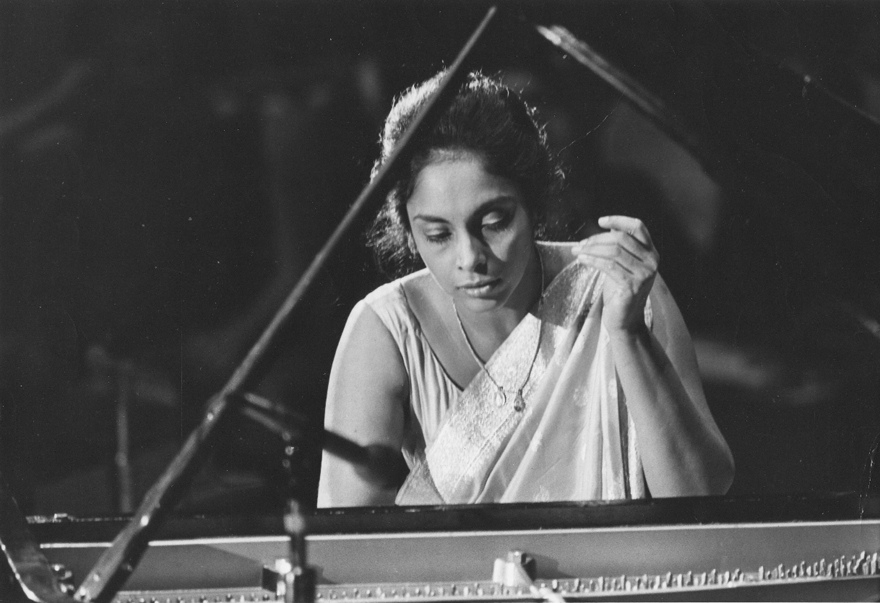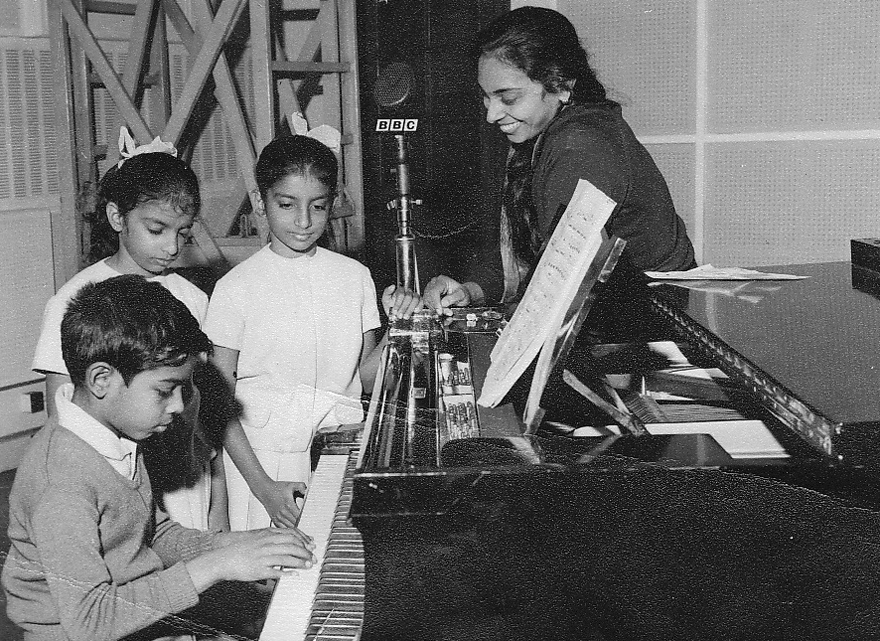International concert pianist Malinee Peris has witnessed history wherever she performs.
Peris, a professor of piano at GW, brought her music to countries around the globe — including World War II era London and a divided Berlin — while touring during her nine decadeslong career. On top of the historical events she’s observed on her tours, Peris said she has seen the GW music department evolve from a small townhouse to a larger program since first starting her position at GW in 1970.
“The changes have not been only in GW,” Peris said. “I think the changes have been everywhere. Some of it, I think, very good. Some things that needed to be changed for years. The idea that as a woman, you could let your opinion actually matter.”
Before she began her international touring or her tenure teaching at GW, the 94-year-old concert pianist said her passion for music and performance began during her childhood in Sri Lanka, where she grew up under British colonial rule.
She said her mother, a piano teacher, started teaching her at age 4. Peris performed her first piano recital at age 12, which she said revealed her affinity for playing.

“From then it was understood that I would be playing the piano, probably teaching the piano, and probably be a better music teacher than my mother — probably earning a little bit more,” Peris said.
She said she received a scholarship to go to the Royal College of Music in London, but her family could not afford to send her to Europe. She said her father got The Times of Ceylon, a local English-language paper, to establish a donation-based scholarship to pay for her 21-day steamship voyage, even though she initially objected.
“I hated the idea,” Peris said. “Because all I could think of was ‘God, everybody will now know that I am poor. Everybody will think I am poor.’”
Peris said she ultimately agreed to the scholarship and moved to London. Her college years overlapped with the end of World War II, and she said submarine sightings and air raid sirens were still happening in England upon her arrival to London. She said during college, she was under constant “press scrutiny” because newspapers from back home continued to report on her.
“There was no option of doing badly,” Peris said. “I mean, I had a personal responsibility to a whole people who contributed from 50 cents upward.”
After graduating from college, Peris’ touring career began against the backdrop of postwar Europe. She said her first postwar piano competition was in Warsaw, Poland, in 1955 and she also performed in cities like Dresden, Germany, which had experienced heavy bombing during the war.
“The world was opening up,” Peris said. “Everything was in rubble. Europe was in rubble. I played all over, with management sending me all over the Russian Empire.”
Peris said she saw Eastern Europe’s shifting political landscape on her tours there and that borders and city names were constantly changing as Soviet-backed governments collapsed. She said political tensions didn’t hinder her tours as she played concerts on either side of the Berlin Wall.
“Both the American officers at Checkpoint Charlie and the East German officers at Checkpoint Charlie, on the other side, used to wave me and say, ‘Hi, you again?’” Peris said.
Peris said her tours took her outside Europe to countries like China and Israel. When China’s Ministry of Culture hosted her for several concerts, she said she played in several cities including Shanghai, Beijing and Nanking.
“I was also representing Sri Lanka in a way,” Peris said. “They were quite friendly with China, so I was taken to see, you know, they gave me a car and they took me by the arm and I walked along the Great Wall.”
Peris also performed in the District, even before she was a GW professor, making her stateside debut in 1956 at the National Gallery of Art. A Washington Evening Star review by Frank C. Campbell called her performance among the most “imaginative” he had seen in a long time.
“The young pianist’s technique is not absolutely immaculate, but it is powerful,” he wrote.
Peris said one of the most defining moments of her career occurred in December 1970 when Peris performed for the U.N. General Assembly on Human Rights Day. She said she felt a sense of unity from the concert, as everyone present felt “a sense of liberation,” and she got to see some famous faces.

“Joan Fontaine read the preamble to the Human Rights concert and Duke Ellington was there,” Peris said. “I met Duke Ellington and he and I had a lot of fun backstage just ribbing each other.”
Peris said she stopped touring in the 1990s, but her legacy lives on back home. Peris said decades have passed since she left Sri Lanka, but the country remembers her well. After growing up there and receiving The Times of Ceylon scholarship funded by voluntary donations, she said she is giving two concerts in Sri Lanka and offering a cash prize to the country’s highest scorer on music exams each year.
“Strangely, I find when I go back to Sri Lanka now, if I play or if I don’t, I’m still in headlines,” Peris said. “And that is 50 years or 60 years, some years after, a second generation after, which amazes me.”
Peris said GW’s purchase and absorption of the Corcoran Gallery of Art in 2014 dealt a blow to Corcoran’s musical offerings by dissolving the school’s smaller community. Before the merger, Corcoran was D.C.’s oldest school of art and design, and the 2014 acquisition helped the school out of a financial crisis.
“I’m sorry that the Corcoran had to sell,” Peris said. “They had very good music there, they had a music piano series in Corcoran before GW bought it. And now, of course, we have music, but we’re still building it up because it had to disintegrate so much.”
After years of touring, teaching and playing, Peris said teaching at GW continues to be an enriching experience, and that she enjoys the time she spends with students.
“I like them very much, I find them fascinating,” Peris said. “I can have an idea of how young people, how their thinking is going.”




